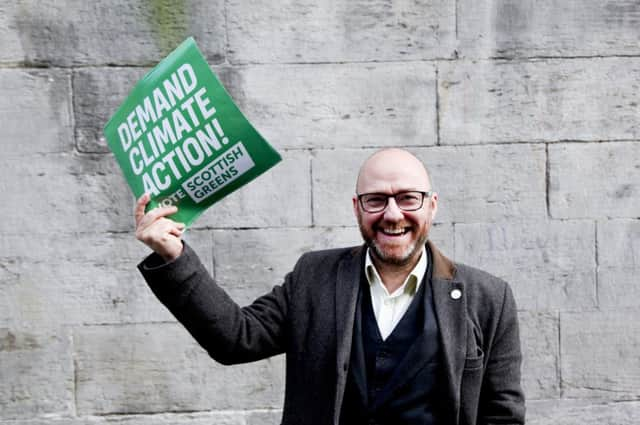Patrick Harvie: What to do if you can’t vote Green


The MSP insists that political debate is enhanced by a broad range of voices and that parties cannot earn success by “bullying others off the ballot paper”.
In an interview with Scotland on Sunday, the Greens co-leader said his party was better prepared for the election this month – where it will stand 22 candidates across Scotland – compared with the snap UK vote in June 2017 when it fielded just five after its resources were exhausted by successive Holyrood and local authority campaigns.
Advertisement
Hide AdAdvertisement
Hide Ad“Where people don’t have a Green standing, I hope we can encourage them to challenge the other candidates,” he said.
“I want to see SNP candidates challenge their own party on fossil fuel divestment. I want to see Labour candidates challenge their own party on its policy of maximum oil and gas extraction. Or Tory candidates challenging their party on Heathrow expansion.”
The Greens are contesting every Edinburgh constituency as well as several in Glasgow. But it’s where the party is not standing – including the key marginal of Perth and North Perthshire – that attracted most attention when the election was first confirmed.
SNP veteran Pete Wishart, who is defending a majority of just 21 in the Fair City, was vocal in his encouragement for the local Green branch not to field a candidate against him.
But Harvie believes such attitudes do a disservice to Green activists who are motivated by a desire to see the climate crisis higher up the political agenda.
“It is achingly familiar pattern at elections,” he said. “Half of my Twitter feed is SNP supporters saying how dare the Greens stand candidates against them. And the other half is full of mostly Tory, but some Labour supporters as well, accusing us of being SNP stooges.
“It’s all a piece of nonsense. I think it comes from a real arrogance that the first-past-the-post (FPTP) electoral system breeds – this winner-takes-all idea, that a party is entitled to someone’s vote.
If people like Stephen Gethins, for example, or Pete Wishart, are worried about a small majority, they need to get out and run a positive campaign. Parties can’t earn success by bullying others off the ballot paper.
Advertisement
Hide AdAdvertisement
Hide Ad“I believe in pluralistic politics. Whether it’s the climate agenda, or independence, politics is better for having a range of voices.
“It’s one of the reasons that FPTP is a terrible system – but that’s not a reason for us to not take part.
“If either the SNP or Labour had taken that approach when they were developing, they wouldn’t have grown into the political forces they are now.”
The Scottish Greens have become a fixture at the Scottish Parliament thanks to the hybrid electoral system that sees 56 of 129 MSPs returned via the list system.
But while Greens are committed to adopting proportional representation (PR) at all elections, Harvie understands his party needs to become more adept at contesting FPTP seats as well.
“During the first 10 years of devolution I think we were guilty of coasting a wee bit,” he added.
“The new PR system was allowing us to get a voice on the national stage through the regional vote at Holyrood.
“I think it distracted us from what has been done successfully in parts of England – most notably in Brighton [where Caroline Lucas was first elected as a Green MP in 2010].
Advertisement
Hide AdAdvertisement
Hide Ad“They were building up, ward by ward, a strong campaigning culture and capacity in the party.
“I think in the first half of devolution, we didn’t really do the party development that we should have.
“The second half has shown that where we are building up, that’s where we are getting results. Whether it is at this election or not, we will translate that into winning constituencies.”
The Greens co-leader identifies the Glasgow Kelvin Holyrood constituency as one where the party is already making progress. Its larger Westminster equivalent, Glasgow North, will be contested for the party by Cass Macgregor on 12 December.
“We have been getting closer,” he said. “The local election results have seen Greens topping the poll at ward level for the first time. We’ve seen good results at Holyrood level.
“We do still suffer from a bit of a stereotype that Greens do well in well-to-do areas. But I think we do better in mixed areas. That’s where we see growth.
“The much wealthier areas – where perhaps people have two cars in the driveway – these are not areas where we can rely on Green votes. But we need a way of reaching those people.
“A green message is about a society that’s good for everyone.”